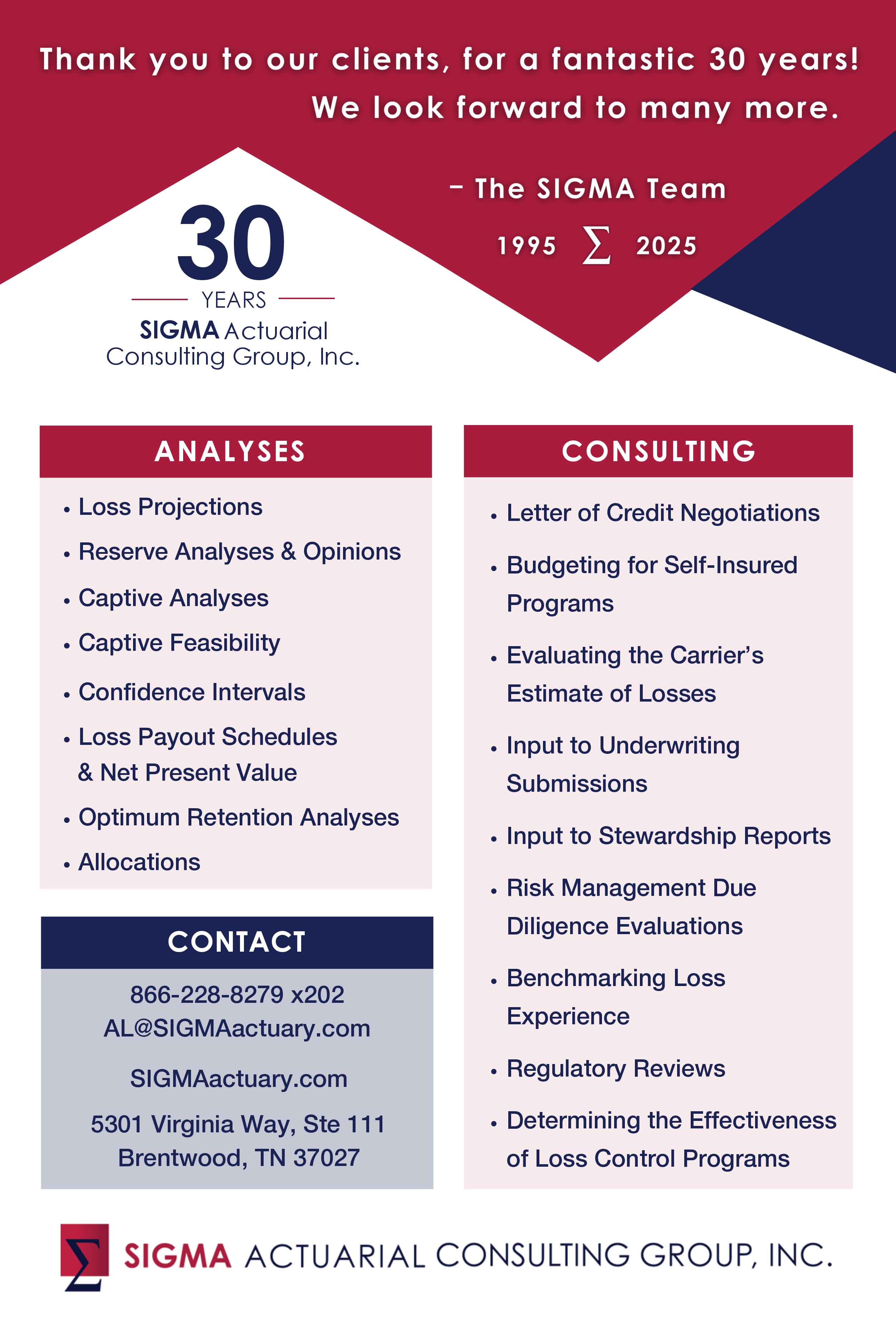Ten years after the inception of its captive insurance law, North Carolina is flourishing, having hit a significant milestone in licences, and having become the third largest domicile in the US. Ned Holmes examines what the Old North State is doing right
A decade is a long time in the captive insurance industry.
Few domiciles symbolise this better than North Carolina, which announced in February that the number of risk-bearing captive entities licensed or approved in the state had moved beyond 1,500 for the first time since its 2013 inception.
Just three of those were licensed in its inaugural year, but the Tarheel state has more than made up for that slow start by developing into the third-largest US domicile, behind only Vermont and Utah.
According to North Carolina’s year-end 2023 statistics, 49 new captive insurance companies were licensed or conditionally licensed last year, while nearly 100 new cells and series were approved or conditionally approved.
This pushed the total number of captive entities under the Department of Insurance’s regulation to 1,069, composed of 311 companies and 758 cells and series.
A journey of over 1,500 captives starts with a single step
In a statement in February, North Carolina insurance commissioner Mike Causey outlined his belief that the milestone is evidence of the “tremendous growth” seen since the introduction of the Captive Insurance Act 10 years ago. Indeed, it was that single step in 2013 that started the programme’s journey of more than 1,500 captives.
Lori Gorman, deputy commissioner of the North Carolina Department of Insurance’s (NCDOI) Captive Insurance Companies Division, explains that the flexibility built into the modern captive law has ensured its success has been two-fold.
“It is rewarding to see that the captive legislation, initially drafted to meet the insurance needs of North Carolina businesses, has had such a positive economic impact while also attracting new businesses to our state,” said Gorman.
“North Carolina has a philosophy of prudent regulation in a business-friendly environment as evidenced by the low-cost formation and operation of captive insurers, competitive premium tax rates, and legislation that provides the Commissioner much discretion in the regulation of captive insurers to be attractive to captive owners and captive managers.”
This is not a programme that rests on its laurels either. Gorman notes that there is a commitment to continue the regular improvements to the legislation, such as the 2022 law that included incentives for captives considering moving to the domicile. She says: “To ensure our captive law remains relevant and current, the North Carolina Captive Insurance Association (NCCIA) and the Department will work collaboratively to propose legislative changes as necessary to meet the emerging needs of the industry.”
The legislation allows for all types of captives as well as risk retention groups, but Nicholas Gurgone, consulting actuary at Pinnacle Actuarial Resources, highlights that incorporated cell structures have “played a notable role in North Carolina’s growth as a domicile. I’ve seen several clients make use of the incorporated cell structure in North Carolina. Our clients have mentioned that they appreciate being able to set up a cell with a smaller amount of capital than a single-parent captive. They then cite the advantage of having solvency protection of the cell’s parent captive in the event of adverse loss experience.”
A healthy ecosystem
The forward-thinking legislation has proven an ideal launch pad, but the growth within the domicile and this latest milestone could not have been achieved without an adaptable and attentive regulator.
“What truly sets North Carolina apart,” according to the Risk Management Advisors’ leadership team, “is the ability of its captive analysts and regulators to provide both timely and accurate guidance - whether clients need assistance with captive formation, ongoing operations, or even shutting down a captive. The outstanding client service and prompt responsiveness to inquiries from captive managers and owners have been hallmarks of the North Carolina domicile.
“They have a keen aptitude for anticipating changes before they arise and implementing robust remedies promptly. This proactive mindset, coupled with a deep understanding of the intricate captive space, enables them to create a regulatory environment that supports captive innovation while maintaining appropriate oversight and risk management protocols.”
Diana Hardy, audit partner at RH CPAs notes: “North Carolina’s insurance commissioner and Department of Insurance are known for their responsiveness and expertise in managing captive insurance.
“The regulators are actively involved in industry initiatives such as educational initiatives through conferences, and many industry events not just within North Carolina but also across the county. They are responsive and maintain open lines of communication not only with captive owners but service providers operating in the state.
“North Carolina has cultivated a robust ecosystem of professionals, including lawyers, accountants and consultants, with expertise in captive insurance. This expertise facilitates the setup and management of captive insurance companies.”
Central to the development and ongoing strength of the state’s captive ecosystem has also been the NCCIA. Since its establishment in 2014, the trade group has facilitated education, expanded its networks, and crucially, persisted in collaborating with the regulator and advocating for legislative reviews to guarantee continuous enhancements. Indeed, Gurgone believes “the strength of the NCCIA has also been key to the domicile’s success”.
He adds: “This recent and notable milestone is evidence of not only the state’s status as a strong domicile, but [is] also reflective of the continued strength of the captive industry. Achieving this milestone also shows North Carolina’s place as a key captive domicile.”
Bumps in the road
North Carolina may be a success story, but it has not been without its challenges.
The most significant of these, Gorman explains, was the Covid-19 pandemic and subsequent staffing shortages.
“We sought creative solutions for our staffing issues, and pivoted to recent experienced retirees and hybrid work schedules to help meet our staffing needs, and to continue to fulfil our programme’s commitment to excellent customer service. The NCDOI has since rebounded and houses a full team of dedicated captive analysts in addition to in-house examiners and actuaries, in support of North Carolina’s captive insurance programme.”
Ten more years?
The growth in recent years shows that those issues are now behind them.
Hardening market conditions and inflation have encouraged more and more businesses to look to alternative risk management solutions, and North Carolina is well placed to help them access the reinsurance market to find better capacity and more advantageous pricing.
Gorman is confident that will continue as the domicile moves into its second decade.
“The state is well positioned to continue to see successful growth, and aims to continue increasing the overall number of captives domiciled in the state,” she says.
The NCDOI’s optimism is shared within the sector.
“The captive insurance sector in North Carolina is likely to continue growing, as more businesses recognise the benefits of forming captives to manage their risks effectively,” says Hardy.
“This growth may come from both new formations, and existing captives expanding their operations, as more captives increasingly explore innovative risk financing strategies to address evolving risks and challenges.
“This could include the use of alternative risk transfer mechanisms, as well as leveraging data analytics and technology to enhance risk management practices. Captives may also broaden their coverage offerings to include a wider range of risks, beyond traditional property and casualty insurance, such as employee benefits, cyber liability, and supply chain disruptions.
“This expansion of coverage reflects the growing complexity of risks faced by businesses and the need for comprehensive risk management solutions.”
The leadership team at Risk Management Advisors adds: “We anticipate the North Carolina captive insurance market will maintain its agility and responsiveness to meet the evolving needs of captive owners seeking tailored solutions.”
“As commercial insurers potentially retract capacity in certain sectors, we expect the state’s captive market to expand and effectively bridge coverage gaps that businesses increasingly rely on captives to fill.”
If the past decade tells us anything, however, it is that remaining adaptable and proactive will be vital to ensuring the domicile can maintain its standing among competitors.
“To ensure continued growth over the next decade, North Carolina must maintain its client-centric approach, providing exceptional service to both captive managers and owners,” explains the leadership team.
“This steadfast focus on meeting the evolving needs of all captive stakeholders will be crucial for attracting new formations amid intensifying competition among domiciles.
“By cultivating a deep bench of captive expertise and nurturing an agile, innovative regulatory environment, North Carolina can reinforce its reputation as a premier domicile.”
Hardy predicts that as the captive sector continues to mature, there “may be an increased focus on governance, compliance, and risk management practices within captive insurance companies”.
She continues: “Regulators may place greater emphasis on ensuring that captives maintain robust governance structures and adhere to best practices in areas such as underwriting, claims management and investment management.”
In accordance with his industry contemporaries, Gurgone adds: “Continuing education is equally important for the domicile and its regulators as it is for actuaries.
“Understanding, anticipating and being prepared to assist clients with emerging risks, changing market conditions, and top exposure priorities will help North Carolina continue to grow as a successful captive domicile.”
Where North Carolina is concerned, one thing appears clear — the journey that started 10 years ago is far from over, and there is excitement throughout the state about what the next decade can bring.





